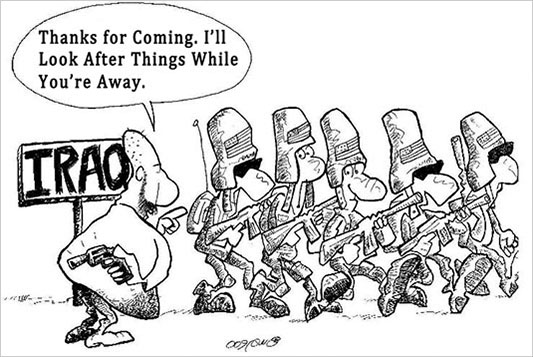March 12, 2009, 3:58 pm
By Max Becherer
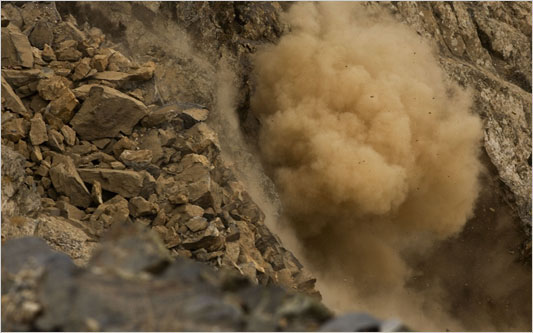 Max Becherer/Polaris, for The New York Times Detonated dynamite throws rock and dust shooting out of an emerald mine on the rock face of the mountains above the Panjshir Valley village of Khenj, Afghanistan.
Max Becherer/Polaris, for The New York Times Detonated dynamite throws rock and dust shooting out of an emerald mine on the rock face of the mountains above the Panjshir Valley village of Khenj, Afghanistan.Khenj, Panjshir Valley–Max Becherer’s photographs and words in a series of posts showcasing dispatches from other New York Times bureaus in the region.
A roar from dynamite exploding from a mine shaft rumbled off the mountains of the Hindu Kush.
It reverberated through the rocks into a 60-meter-deep hole where Ahmad Jawead was using a hammer and chisel to quarry for emeralds near Khenj, in Afghanistan’s Panjshir Valley.
Working by gas lamp, Mr. Jawead, 22, put down his hammer and started using a pneumatic jackhammer to bore holes in the granite.
Read more…
March 10, 2009, 6:06 pm
By Mudhafer al-Husaini
 Sattar Attiya
Sattar AttiyaFor Sattar Attiya the American invasion of Iraq helped his bodybuilding career in an unexpected way. The chaos and open borders meant he could get proteins and nutritional supplements which were not available under Saddam Hussein’s regime.
Five years later Sattar Attiya became world champion in the 65kg category (just over 143 pounds) of the International Federation of Body Building and Fitness world championships held in Bahrain on November 2008.
Born in 1980 in one of the poor Shiite neighborhoods of southern Baghdad, Sattar began training in 1997, in a city whose many weightlifting gymnasiums bear crudely-drawn portraits of the country’s bodybuilding idol: Arnold Schwarzenegger. Sattar has won Iraqi, Arab and Asian competitions but was unable to participate in many international championships before the 2003 war because Iraq was suspended under the international sanctions imposed on his country.
Read more…
March 6, 2009, 12:21 pm
By Nazila Fathi AND Baghdad Bureau
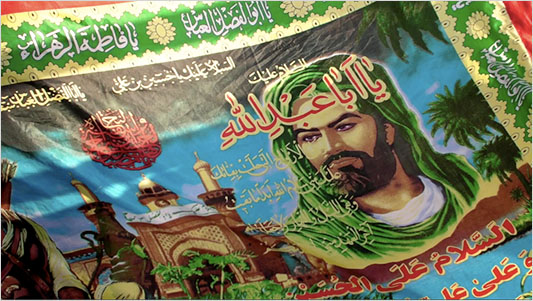 A banner of Imam Hussein carried by pilgrims walking to Karbala. (Photo: Stephen Farrell / The New York Times.)
A banner of Imam Hussein carried by pilgrims walking to Karbala. (Photo: Stephen Farrell / The New York Times.)
After Baghdad Bureau posted about Shiite pilgrims carrying portraits of early Islamic holy figures, one reader, Andrew, asked: “I thought depictions of Islamic saints and prophets was forbidden.” Baghdad Bureau and our NYT colleague Nazila Fathi in Tehran Bureau, gained differing opinions:
Read more…
March 5, 2009, 3:56 pm
By Stephen Farrell
 Cellphone billboard in Baghdad: “Now is the Time for Change.”
Cellphone billboard in Baghdad: “Now is the Time for Change.” A colleague flew into Baghdad last week, and his pocket started buzzing before he left the airport. He had accidentally left his Blackberry on, and, for the first time ever, it was working in Iraq.
Delivering real estate lists from New York, to be precise. He is buying an apartment there – which is why he needs a holiday in Baghdad – and his realtor was sending him emails.
He was still shaking his head a couple of hours later as he drove into the Baghdad Bureau. Only six years ago digital communications were all but non-existent in Iraq. Read more…
March 4, 2009, 11:44 am
By Baghdad Bureau
BAGHDAD–Two of Baghdad’s most polarized communities held a road race to encourage reconciliation last week.
More than 900 runners set off from the Sunni bastion of Adhamiya and ran across the River Tigris to the Shiite neighborhood of Kadhimiya.
The one and a quarter mile race took them across the recently-reopened Aimma Bridge, which linked the two districts until the disaster of August 2005 when rumors of a suicide bomber in a crowd of Shiite pilgrims provoked a stampede in which nearly 1,000 people were killed.
The runners came from all over Baghdad, both Shiite and Sunni neighborhoods. They were aged 8 to 20, wore white and green sports clothes and carried Iraqi flags. Read more…
March 2, 2009, 1:58 pm
By Suadad al-Salhy
After three weeks absorbing and analyzing the results of the Jan. 31 provincial elections, in the corridors and meeting rooms of the Iraqi parliament, it seems that all the political blocs are terrified for their future. They have seen that Prime Minister Nuri Kamal al-Maliki succeeded in these elections, and they are worried that he will use this success to win the next one, which is much more important.
There are no more than eight months before the national elections, a very short time for another political leader to emerge on the national scene to challenge Mr. Maliki.
All the other political parties are now afraid that Mr. Maliki will build momentum, because the Iraqi people consider Mr. Maliki to be responsible for the successes and security progress of the last two years. They have forgotten the roles of the Americans, the Awakening Councils, the other political parties and everything else. Mr. Maliki was the only one who took advantage of all these factors. Read more…
February 27, 2009, 5:37 pm
By Stephen Farrell
BAGHDAD — Finding an American on the streets of Baghdad is not as easy as it used to be.
More than 140,000 American troops in Iraq, and we only needed a
handful to talk to about President Obama’s withdrawal plan, but it
took more than half an hour of hard driving to find one, outside the
Green Zone. And that with the pedal to the metal, around semi-deserted
streets on Friday – the Muslim world’s weekend.
The invisibilization - so to speak - of the American presence has
happened gradually, so that you hardly noticed if you were here
throughout. But the starting point and endgame are worlds apart. Read more…
February 27, 2009, 1:03 am
By Anwar Ali
Each day I pass through a checkpoint on my way to work, and now it has a new detector that is supposed to discover explosive materials. It has an aerial that moves around and points to whatever it detects.
Iraqis started to notice this device two months ago in some of Baghdad’s main streets. It is a new phenomenon, and a little bit funny at the same time.
Each time our family’s car is searched, it gives off the alarm and the guards take a long time searching the car while we are sitting in it. My husband was worried at first that we may have a sticky bomb in our car that we didn’t know about. The guards were searching the car, and sometimes my purse and bag. Yet the alarm was still on.
It turned out that the problem was the car freshening deodorant that my husband keeps in the car. We threw it away. Next day, the same problem, this time because of the scented wet tissues in the car. We handed all that to the guards.
The next day, another alarm, although I made sure to leave all suspect things at home. The problem was my headache medicine and a small bottle of nail polish in my purse.
One checkpoint guard told me that they once searched everything in a minibus that was raising the alarm, but nothing was there. Then they saw a small hole in the car, and the driver said, “A long time ago the American forces randomly shot my car and the bullet is still somewhere in my car.”
Another time they searched everything inside the car until they noticed that when the driver was out of the car, the device gave off no alarm, and the pointer turned towards the driver. Of course they
searched him and found nothing. The problem turned out to be that he had a piece of platinum in his jawbone from a medical operation.
February 25, 2009, 2:50 pm
By Dexter Filkins
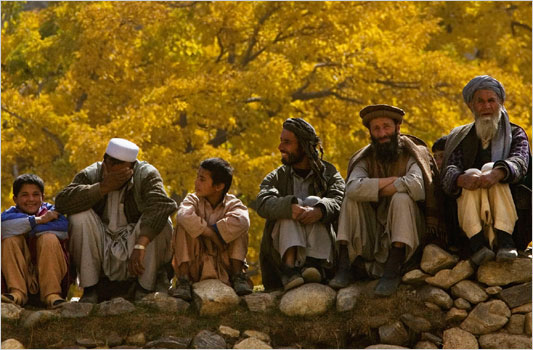 Max Becherer/Polaris for The New York Times
Max Becherer/Polaris for The New York Times
Today we begin showcasing dispatches from other New York Times bureaus in the region. Dexter Filkins sees Iraq through the prism of the other American conflict: Afghanistan.
KABUL–In their quiet moments, aid workers call it “the tragedy:” the billions of dollars that never arrived here. The troops that landed somewhere else. The bright minds that turned to that other, greater subject. And, in all those events, the sad sinking of the promise that greeted the American-led victory over the Taliban in November 2001, more than seven years ago.
The “tragedy” these aid workers are referring to, of course, is the war in Iraq. Not that the Iraq war itself was tragic but that it was calamitous in its results for the other war that suddenly fell to the lower tier. More than any other factor, it is the American invasion of Iraq that looms over Afghanistan and all of its dashed hopes.
Read more…
February 24, 2009, 12:30 am
By Steven Lee Myers
MAHMUDIYA– Inside a tribal guest house near here, shaded by palm trees and surrounded by irrigated fields of barley and wheat, the talk over tea the other day quickly turned to politics. Not Iraq’s, America’s.
Sheik Moyad Fadhel Hussein al-Ameri, one of three brothers who were the hosts, said he was worried. A former mayor of Mahmudiya, he has a politician’s acuity. And with it, he has closely tracked President Barack Obama’s early statements on Iraq.
“President Obama is always talking about change,” he said, dressed in traditional robes and headdress and seated in one of the plush arm chairs that ringed the long greeting hall. “We would like to know what change.”
Read more…
February 21, 2009, 6:46 pm
By Stephen Farrell AND Baghdad Bureau
Caution: This blog post contains harrowing photographs.
 The families of Iraqi political prisoners run into Abu Ghraib to find their relatives after Saddam Hussein declared an amnesty in October 2002. (Photo: Tyler Hicks/The New York Times).
The families of Iraqi political prisoners run into Abu Ghraib to find their relatives after Saddam Hussein declared an amnesty in October 2002. (Photo: Tyler Hicks/The New York Times).Abu Ghraib Prison, the Iraqi jail to which notoriety has clung for decades, has reopened under new management. The Iraqi government has renamed it Baghdad Central Prison, given it fresh paint and moved in the first of what will eventually be several thousand prisoners.
Following the security contractor Blackwater’s renaming itself Xe, this will remove two of the most hated names in Iraq from the official record. But not from the memory, and almost certainly not from common usage.
The Iraqi government says Abu Ghraib was designed by the American architect Edmund Whiting, and built by British contractors in the late 1960s. It first opened as a prison in 1970. It was taken over by the Americans after the 2003 invasion which toppled Saddam Hussein’s regime and was handed over by them to the Iraqis on Sep. 13, 2006. The renovation started on Dec. 1, 2008.
Prime Minister Nuri Kamal al-Maliki’s government opened the gates of the first newly-renovated section on Saturday to permit journalists a rare glimpse inside its - now cream, lavender and sky blue - walls.
But the promise of a new era can also be a time for remembrance: below are accounts from Iraqis, correspondents and photographers who lived and recorded Abu Ghraib’s recent history.
Read more…
February 19, 2009, 3:44 pm
By Stephen Farrell
 Muntader al-Zaidi throws a shoe at President George W. Bush during a news conference with Iraq’s Prime Minister Nuri Kamal al-Maliki on 14 Dec. 2008 (Evan Vucci/Associated Press)
Muntader al-Zaidi throws a shoe at President George W. Bush during a news conference with Iraq’s Prime Minister Nuri Kamal al-Maliki on 14 Dec. 2008 (Evan Vucci/Associated Press)The Iraqi journalist Muntader al-Zaidi appeared in court in Baghdad Thursday for the start of his trial for throwing shoes at President George W. Bush in December, and delivered a speech trying to justify his actions. As his defense lawyers seek to get the charges against him reduced, his unorthodox act of protest has led to copycat shoe-hurling around the world, including Britain, Argentina, Lebanon, India and Mexico. Many, but not all, were demonstrations against Israel’s December-January offensive in Gaza, during which memories of Mr. al-Zaidi’s brief outburst were particularly fresh.
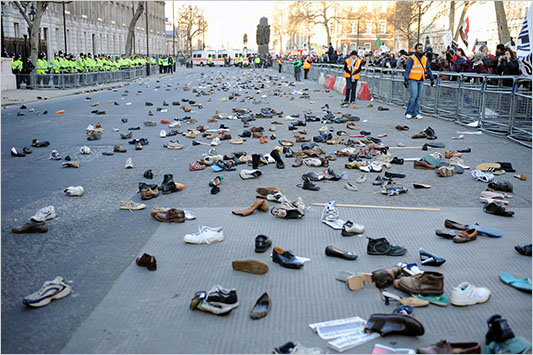
Hundreds of shoes lie in the street outside the British Prime Minister’s office in Downing Street during a protest against Israel’s military operation in Gaza. Saturday Jan. 3, 2009. (Photo: Fiona Hanson/PA Wire) Read more…
February 19, 2009, 1:36 pm
By Steven Lee Myers
Steven Lee Myers, then a traveling member of the White House press corps and now Baghdad Correspondent of The New York Times, was at the December press conference where Iraqi journalist Muntader al-Zaidi threw his shoes at President George W. Bush.
Mr. Zaidi appeared before a court in Baghdad for 90 minutes on Thursday morning, only to have his trial adjourned until March 12.
In an audio report, Myers recalls that December moment and assesses its impact on Iraqis and Americans.
February 18, 2009, 11:50 am
By Mudhafer al-Husaini
Mudhafer al-Husaini has applied for a program which allows Iraqi employees of American media companies to apply for refugee status in the United States. Changing circumstances at home and in the U.S. have prompted some to reconsider, although they have long dreamed of escape.
BAGHDAD–Several months ago I applied for a refugee program that resettles Iraqis who have worked closely with the American forces, media and other organizations. Many of my colleagues with The New York Times have also applied for the program, but some of them are now worried about the economic crisis in the States.
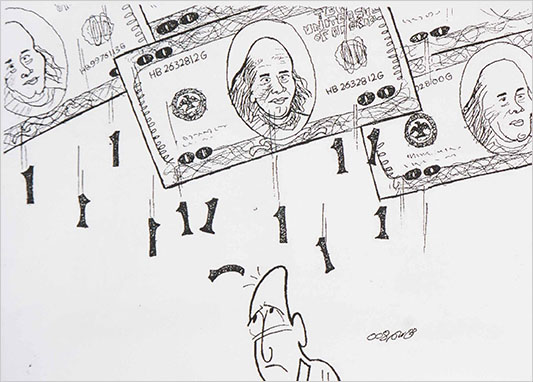 By Qassem H.J.
By Qassem H.J. Read more…
 Max Becherer/Polaris, for The New York Times Detonated dynamite throws rock and dust shooting out of an emerald mine on the rock face of the mountains above the Panjshir Valley village of Khenj, Afghanistan.
Max Becherer/Polaris, for The New York Times Detonated dynamite throws rock and dust shooting out of an emerald mine on the rock face of the mountains above the Panjshir Valley village of Khenj, Afghanistan.




